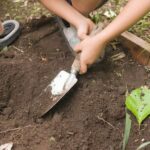Weeds can be a nuisance to any garden, but they can be particularly problematic in vegetable gardens. What kills weeds in vegetable gardens is a crucial question for anyone looking to maintain the health and productivity of their crops. In this article, we will explore various methods for controlling weeds in vegetable gardens, from chemical weed killers to organic alternatives and preventive measures.
Weed control is essential in vegetable gardens as weeds compete with the vegetables for water, nutrients, and sunlight, ultimately affecting their growth and yield. By understanding the importance of weed control, gardeners can implement effective strategies to keep their vegetable gardens healthy and thriving.
In the following sections, we will discuss common types of weeds found in vegetable gardens, the pros and cons of chemical weed killers for vegetable gardens, organic methods for killing weeds, mulching as a weed control method, tools and techniques for manual weed removal, natural weed-killing solutions such as vinegar, salt, and baking soda, and cover crops as a preventive measure.
By exploring these various approaches to weed control, gardeners can determine the best practices for maintaining a thriving vegetable garden.
Common Types of Weeds Found in Vegetable Gardens
Weeds are a common problem in vegetable gardens, competing with your desired plants for water, nutrients, and sunlight. Identifying the types of weeds commonly found in vegetable gardens is essential for effective weed control. Some common types of weeds you may encounter in your vegetable garden include:
1. Annual Weeds: These weeds complete their life cycle within one year, germinating from seeds, growing, flowering, and producing seeds before dying. Examples include chickweed, crabgrass, and purslane.
2. Perennial Weeds: Perennial weeds live for more than two years and can be particularly challenging to control due to their deep root systems. Examples include dandelions, thistles, and bindweed.
3. Grass Weeds: Grasses can be particularly invasive in vegetable gardens, competing with your crops for resources. Some examples of grass weeds include Bermuda grass, quackgrass, and crabgrass.
It’s essential to stay vigilant and regularly inspect your vegetable garden for these common types of weeds to prevent them from taking over and affecting the health and productivity of your plants.
In addition to knowing the common types of weeds found in vegetable gardens, it’s also important to understand how to effectively combat them without harming your vegetables or the environment. Organic methods for killing weeds such as hand-weeding, mulching, and natural weed-killing solutions like vinegar can all contribute positively to a healthier garden while avoiding the use of harmful chemicals that could affect your edible crops.
| Type of Weed | Examples |
|---|---|
| Annual Weeds | Chickweed, Crabgrass, Purslane |
| Perennial Weeds | Dandelions Bindweed |
| Grass Weeds | Bermuda grass Crabgrass |
Chemical Weed Killers
One of the main advantages of using chemical weed killers is their effectiveness in killing a wide range of weeds. They can provide quick results and are relatively easy to apply. However, it’s important to carefully follow the instructions on the label to ensure safe and effective use. Additionally, some chemical weed killers have residual effects that can prevent weed regrowth for an extended period.
On the downside, chemical weed killers can have negative impacts on the environment if not used correctly. They may harm beneficial insects, wildlife, and water sources if they run off into nearby areas. Moreover, there is a risk of contamination if the chemicals come into contact with edible parts of the vegetables. It’s crucial to select herbicides that are specifically labeled for use in vegetable gardens and follow safety precautions when applying them.
When considering whether to use chemical weed killers in a vegetable garden, it’s important to weigh the benefits against the potential risks and take proper precautions to ensure safe and effective application.
| Pros | Cons |
|---|---|
| Effectively kills a wide range of weeds | Potential harm to beneficial insects and wildlife |
| Provides quick results | Risk of contaminating edible parts of vegetables |
| Can prevent weed regrowth for an extended period | Potential negative impact on the environment if not used correctly |
Organic Methods for Killing Weeds in Vegetable Gardens
Hand-Pulling Weeds
One of the most straightforward organic methods for killing weeds in vegetable gardens is hand-pulling. This method involves physically removing weeds from the soil by pulling them out with your hands or using a hand tool. It is essential to ensure that the entire plant, including its roots, is removed to prevent regrowth. Hand-pulling is a labor-intensive process but can be an effective way to control weeds, especially for smaller garden areas.
Homemade Weed-Killing Solutions
Another effective organic method for killing weeds in vegetable gardens is using homemade solutions such as vinegar, salt, and baking soda. These natural ingredients can be mixed with water and sprayed directly onto the weeds to kill them. However, it is important to use these solutions carefully as they can also harm desirable plants if not applied correctly. Additionally, it may take multiple applications to completely eliminate stubborn weeds.
Cover Crops
Using cover crops is another preventive measure for weed control in vegetable gardens. Cover crops are planted specifically to suppress weed growth by outcompeting them for nutrients and space. They also help improve soil structure and fertility while providing a protective cover during periods when the garden may otherwise be left bare. Legumes such as clover or vetch are popular choices for cover crops in vegetable gardens due to their ability to fix nitrogen in the soil.
By incorporating these organic methods into their gardening practices, individuals can effectively control weeds in their vegetable gardens while promoting sustainability and environmental stewardship.
Mulching as a Weed Control Method in Vegetable Gardens
Mulching serves as an effective and natural method for controlling weeds in vegetable gardens. By covering the soil with a layer of organic materials such as straw, wood chips, or leaves, mulch creates a barrier that prevents weed seeds from receiving enough light to germinate and grow. Additionally, mulch helps to retain soil moisture and regulate temperature, creating a healthier environment for vegetables while suppressing weed growth.
One of the key advantages of using mulch as a weed control method in vegetable gardens is its ability to improve soil structure and fertility over time. Organic mulches gradually break down, adding valuable nutrients to the soil as they decompose. This not only promotes healthy plant growth but also reduces the need for chemical fertilizers, making it an environmentally friendly option for weed control.
In addition to its weed-suppressing properties, mulch also helps in preventing soil erosion and compaction, ultimately contributing to the overall health and productivity of the vegetable garden. Overall, choosing the right type of mulch and applying it properly can significantly reduce the need for manual weeding or chemical weed killers, making it a sustainable and eco-friendly choice for maintaining a vibrant and healthy vegetable garden.
Tools and Techniques for Manually Removing Weeds in Vegetable Gardens
When it comes to maintaining a healthy vegetable garden, one of the most effective methods for weed control is manual removal. This approach allows you to directly target and remove weeds without the use of chemicals, making it safe for your vegetables and the environment. By understanding the tools and techniques for manually removing weeds, you can keep your vegetable garden looking tidy and ensure that your plants have the best chance to thrive.
Tools for Manual Weed Removal
There are several tools specifically designed for the manual removal of weeds in vegetable gardens. Handheld tools such as hand trowels, hoes, and weeders are excellent for targeting individual weeds and removing them from the root. For larger areas, long-handled hoes and cultivators can be useful for breaking up soil and removing larger weeds. Additionally, investing in a sturdy pair of gardening gloves will protect your hands while pulling out weeds.
Techniques for Effective Weed Removal
To effectively remove weeds manually, it’s essential to get to the root of the problem – literally. When using handheld tools, it’s important to get as close to the base of the weed as possible to ensure that you are removing it entirely from the soil. It’s also helpful to water your garden before weeding, as this can loosen the soil and make it easier to pull out entire weed plants with their roots intact.
Benefits of Manual Weed Removal
Manual weed removal not only eliminates unwanted plants from your garden but also provides an opportunity to inspect your plants closely for any signs of disease or pests. This hands-on approach allows you to take a proactive stance on maintaining a healthy vegetable garden while avoiding potential damage that chemical weed killers may cause. Moreover, manually removing weeds is an excellent form of physical activity that can contribute to both a healthy garden and a healthy gardener.
Natural Weed-Killing Solutions
When it comes to finding natural ways to effectively kill weeds in vegetable gardens, many gardeners turn to household items such as vinegar, salt, and baking soda. These ingredients have been known to be effective in killing weeds without the use of harsh chemicals that may harm your vegetable plants. Here are some natural weed-killing solutions using vinegar, salt, and baking soda:
- Vinegar: White vinegar is a popular natural weed killer due to its acetic acid content, which can dry out and kill weeds upon contact. To use vinegar as a weed killer, simply fill a spray bottle with white vinegar and spray it directly onto the leaves and stems of the unwanted weeds. Be cautious, however, as vinegar may also damage or kill desirable plants if not applied carefully.
- Salt: Another natural weed-killing solution is salt. When used in moderation, salt can be effective in killing weeds by dehydrating them. To use salt as a weed killer, mix it with water at a ratio of 1 part salt to 2 parts water (or even less) and apply it directly onto the weeds. It’s important to avoid using too much salt as it can also render the soil infertile for future plant growth.
- Baking Soda: Baking soda is not only great for baking but also for eliminating weeds in your vegetable garden. Simply sprinkle baking soda directly onto the leaves of the unwanted plants. The sodium bicarbonate in baking soda will disrupt the cell walls of the weeds and cause them to wither and die.
By utilizing these natural weed-killing solutions, you can effectively control unwanted vegetation without resorting to synthetic chemicals that may harm your vegetable crops or pose risks to human health. However, it’s important to note that these natural methods should still be used with caution and discretion to avoid any unintended consequences on your vegetable garden.
Cover Crops as a Preventive Measure for Weed Control in Vegetable Gardens
Cover crops can be an effective way to prevent weeds from taking over vegetable gardens. By planting cover crops, gardeners can smother out weed growth and provide competition for resources such as sunlight, water, and nutrients. This method not only helps to control the current weed population but also prevents future weed growth by creating a dense canopy that shades and inhibits weed germination.
Some common cover crops that are used for weed control in vegetable gardens include:
- Winter rye
- Buckwheat
- White clover
- Hairy vetch
These cover crops can be sown directly into the soil and then tilled under before planting vegetables to add organic matter to the soil. Not only do cover crops suppress weeds, but they also improve soil structure and fertility, making them a sustainable and environmentally friendly choice for weed control in vegetable gardens.
In addition to preventing weed growth, cover crops also help to reduce erosion, attract beneficial insects, and enhance biodiversity in the garden. By incorporating cover crops into their gardening practices, individuals can effectively manage weeds while promoting a healthy and sustainable growing environment.
Conclusion
In conclusion, maintaining a weed-free vegetable garden is essential for the health and productivity of your plants. While there are various methods for killing weeds in vegetable gardens, it’s important to consider the pros and cons of each approach. Chemical weed killers may be effective, but they can also harm your vegetables and the environment. Organic methods, such as mulching, manual removal, and natural solutions like vinegar and baking soda, offer safer alternatives.
Regular maintenance is key to successful weed control in vegetable gardens. This includes staying on top of weeding, using cover crops to prevent weed growth, and implementing a combination of different weed control methods for maximum effectiveness. It’s important to also monitor your garden regularly for any signs of weed growth and take action promptly.
Remember that prevention is always better than cure when it comes to weed control. By taking proactive measures and staying consistent with your maintenance efforts, you can effectively keep weeds at bay in your vegetable garden without endangering the health of your plants or the environment. With the right combination of methods and regular attention to your garden, you can enjoy a thriving vegetable garden free from pesky weeds.
Frequently Asked Questions
How Do I Kill Weeds in My Garden Without Killing Vegetables?
One way to kill weeds in your garden without harming your vegetables is through mulching. Adding a layer of mulch helps smother the weeds and prevents them from getting sunlight, which they need to grow. This method can also help retain moisture in the soil for your vegetables.
How Do You Get Rid of Weeds in a Vegetable Garden?
Getting rid of weeds in a vegetable garden can be done through regular hand-pulling or hoeing. By removing weeds manually, you can prevent them from competing with your vegetable plants for nutrients and space. Additionally, using a shallow hoe can cut off weed stems just below the soil surface, inhibiting their growth.
How Do You Permanently Kill Weeds in Soil?
To permanently kill weeds in soil, you can use a non-selective herbicide like glyphosate. Be sure to carefully follow the instructions on the product label to avoid damaging desired plants.
Another approach is solarization, where you cover the soil with clear plastic to trap heat and effectively cook the weeds and their seeds beneath it. This method requires several weeks of sunlight and warm temperatures to work effectively.

If you’re looking to get into vegetable gardening, or are just looking for some tips on how to make your current garden better, then you’ve come to the right place! My name is Ethel and I have been gardening for years. In this blog, I’m going to share with you some of my best tips on how to create a successful vegetable garden.





